Globalization Impact on Logistics Industry: A Case Study of Amazon
VerifiedAdded on 2023/06/17
|49
|12841
|420
Case Study
AI Summary
This case study investigates the impact of globalization on the logistics industry, focusing on Amazon as a prime example. It examines the meaning and role of globalization in large UK companies, explores the importance and influencing factors of effective international management strategies, and analyzes the challenges faced by companies using globalization. The research employs a quantitative approach, utilizing questionnaires and secondary data from journals and articles. Findings indicate that globalization is crucial for business expansion, economic growth, and acquiring skilled workforce. The study concludes with recommendations for companies, such as forming diverse workforces, conducting trainings, and adopting cross-border digital channels, to leverage the opportunities presented by globalization. Desklib provides access to this case study and many other solved assignments for students.
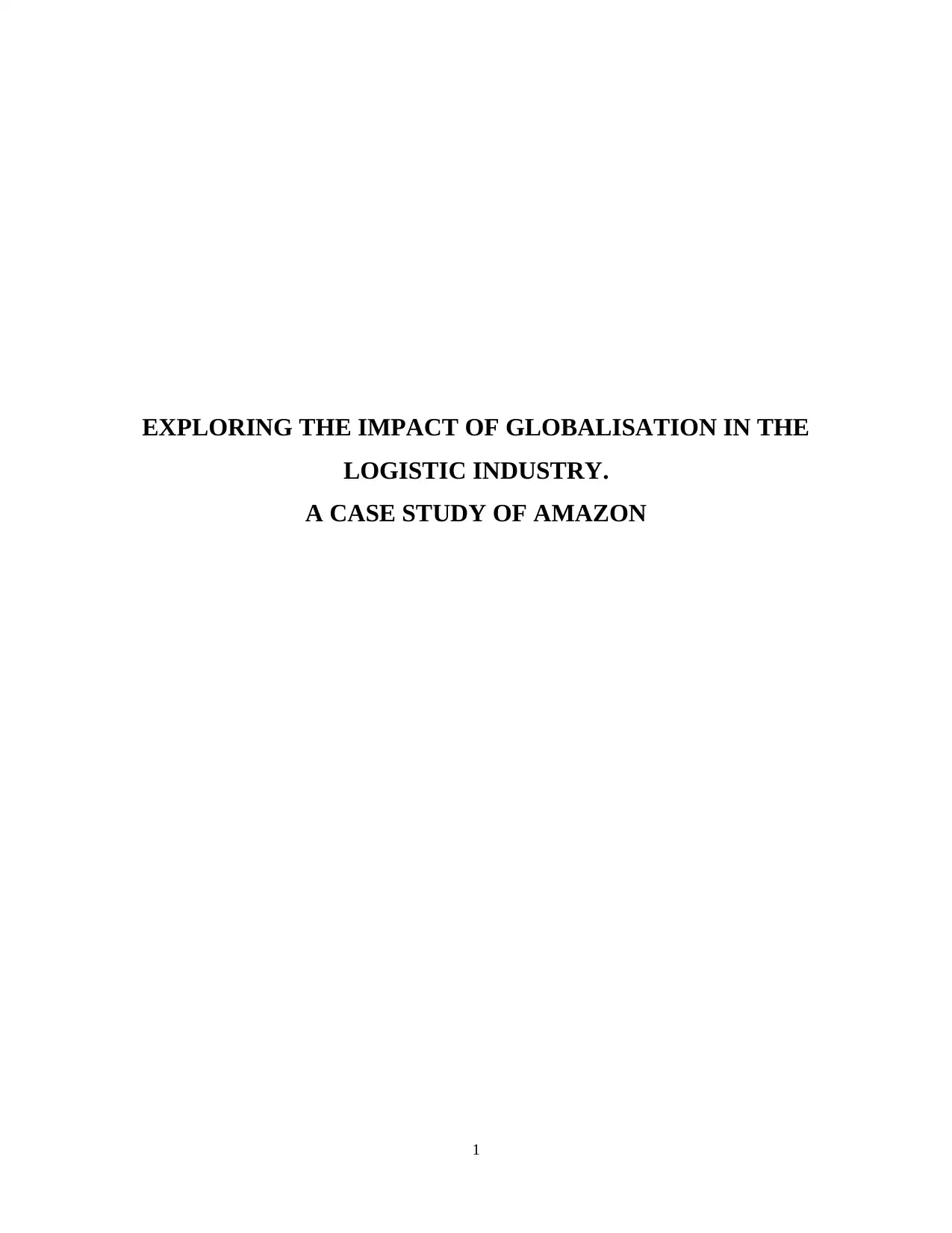
EXPLORING THE IMPACT OF GLOBALISATION IN THE
LOGISTIC INDUSTRY.
A CASE STUDY OF AMAZON
1
LOGISTIC INDUSTRY.
A CASE STUDY OF AMAZON
1
Paraphrase This Document
Need a fresh take? Get an instant paraphrase of this document with our AI Paraphraser
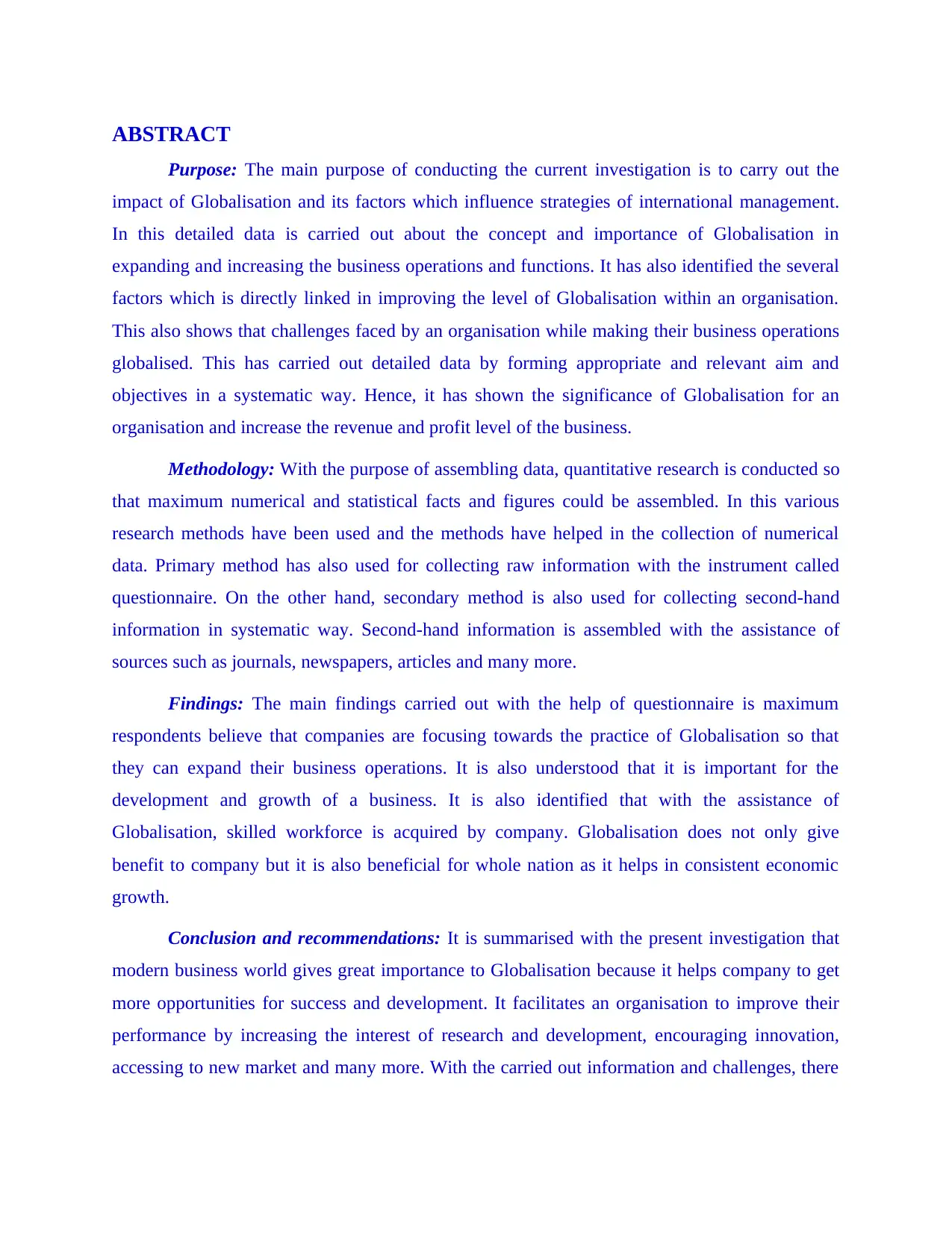
ABSTRACT
Purpose: The main purpose of conducting the current investigation is to carry out the
impact of Globalisation and its factors which influence strategies of international management.
In this detailed data is carried out about the concept and importance of Globalisation in
expanding and increasing the business operations and functions. It has also identified the several
factors which is directly linked in improving the level of Globalisation within an organisation.
This also shows that challenges faced by an organisation while making their business operations
globalised. This has carried out detailed data by forming appropriate and relevant aim and
objectives in a systematic way. Hence, it has shown the significance of Globalisation for an
organisation and increase the revenue and profit level of the business.
Methodology: With the purpose of assembling data, quantitative research is conducted so
that maximum numerical and statistical facts and figures could be assembled. In this various
research methods have been used and the methods have helped in the collection of numerical
data. Primary method has also used for collecting raw information with the instrument called
questionnaire. On the other hand, secondary method is also used for collecting second-hand
information in systematic way. Second-hand information is assembled with the assistance of
sources such as journals, newspapers, articles and many more.
Findings: The main findings carried out with the help of questionnaire is maximum
respondents believe that companies are focusing towards the practice of Globalisation so that
they can expand their business operations. It is also understood that it is important for the
development and growth of a business. It is also identified that with the assistance of
Globalisation, skilled workforce is acquired by company. Globalisation does not only give
benefit to company but it is also beneficial for whole nation as it helps in consistent economic
growth.
Conclusion and recommendations: It is summarised with the present investigation that
modern business world gives great importance to Globalisation because it helps company to get
more opportunities for success and development. It facilitates an organisation to improve their
performance by increasing the interest of research and development, encouraging innovation,
accessing to new market and many more. With the carried out information and challenges, there
Purpose: The main purpose of conducting the current investigation is to carry out the
impact of Globalisation and its factors which influence strategies of international management.
In this detailed data is carried out about the concept and importance of Globalisation in
expanding and increasing the business operations and functions. It has also identified the several
factors which is directly linked in improving the level of Globalisation within an organisation.
This also shows that challenges faced by an organisation while making their business operations
globalised. This has carried out detailed data by forming appropriate and relevant aim and
objectives in a systematic way. Hence, it has shown the significance of Globalisation for an
organisation and increase the revenue and profit level of the business.
Methodology: With the purpose of assembling data, quantitative research is conducted so
that maximum numerical and statistical facts and figures could be assembled. In this various
research methods have been used and the methods have helped in the collection of numerical
data. Primary method has also used for collecting raw information with the instrument called
questionnaire. On the other hand, secondary method is also used for collecting second-hand
information in systematic way. Second-hand information is assembled with the assistance of
sources such as journals, newspapers, articles and many more.
Findings: The main findings carried out with the help of questionnaire is maximum
respondents believe that companies are focusing towards the practice of Globalisation so that
they can expand their business operations. It is also understood that it is important for the
development and growth of a business. It is also identified that with the assistance of
Globalisation, skilled workforce is acquired by company. Globalisation does not only give
benefit to company but it is also beneficial for whole nation as it helps in consistent economic
growth.
Conclusion and recommendations: It is summarised with the present investigation that
modern business world gives great importance to Globalisation because it helps company to get
more opportunities for success and development. It facilitates an organisation to improve their
performance by increasing the interest of research and development, encouraging innovation,
accessing to new market and many more. With the carried out information and challenges, there

are certain recommendations that are recommended to the companies such as: forming diverse
workforce, conducting trainings, adopting cross-border digital channels and many more.
3
workforce, conducting trainings, adopting cross-border digital channels and many more.
3
⊘ This is a preview!⊘
Do you want full access?
Subscribe today to unlock all pages.

Trusted by 1+ million students worldwide
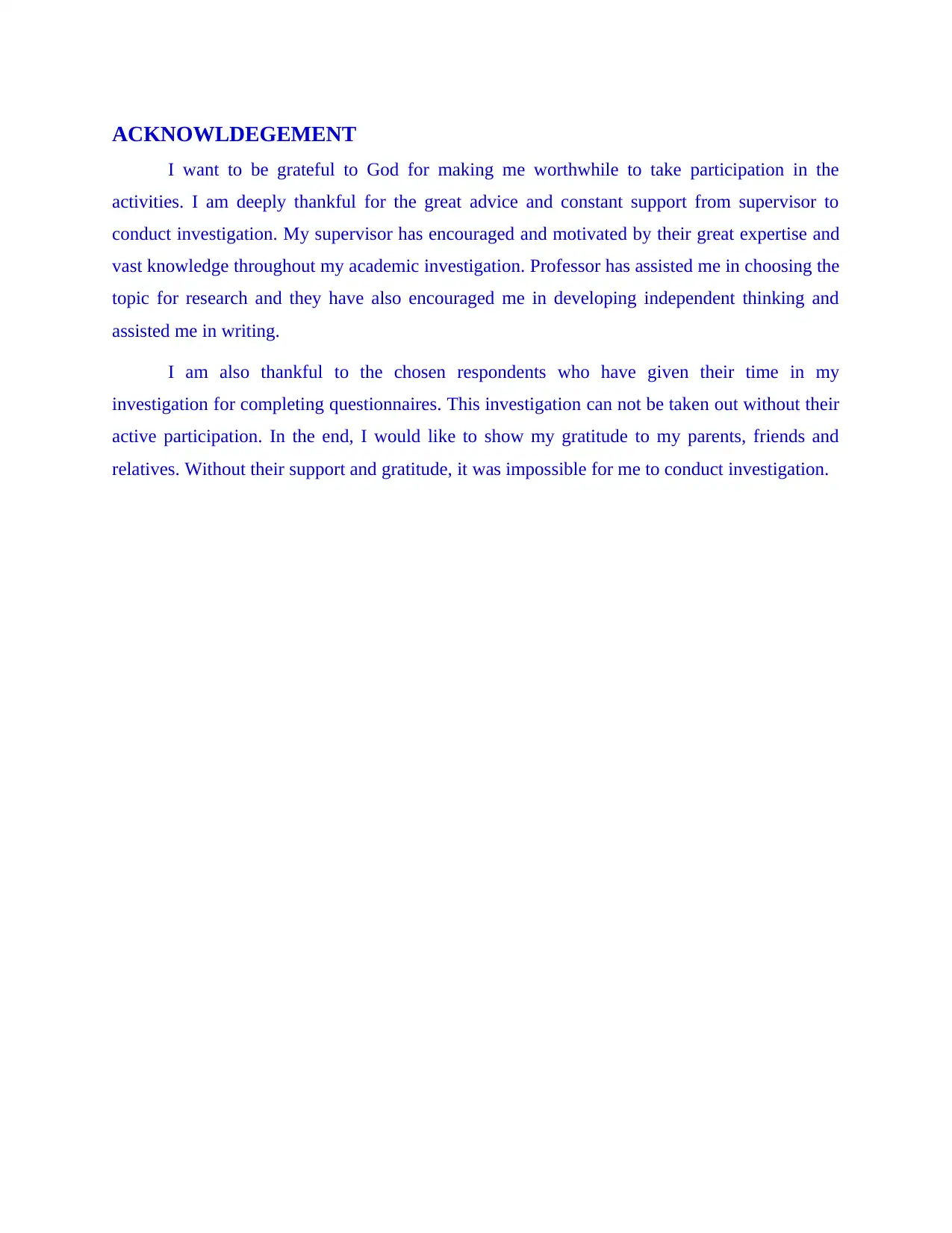
ACKNOWLDEGEMENT
I want to be grateful to God for making me worthwhile to take participation in the
activities. I am deeply thankful for the great advice and constant support from supervisor to
conduct investigation. My supervisor has encouraged and motivated by their great expertise and
vast knowledge throughout my academic investigation. Professor has assisted me in choosing the
topic for research and they have also encouraged me in developing independent thinking and
assisted me in writing.
I am also thankful to the chosen respondents who have given their time in my
investigation for completing questionnaires. This investigation can not be taken out without their
active participation. In the end, I would like to show my gratitude to my parents, friends and
relatives. Without their support and gratitude, it was impossible for me to conduct investigation.
I want to be grateful to God for making me worthwhile to take participation in the
activities. I am deeply thankful for the great advice and constant support from supervisor to
conduct investigation. My supervisor has encouraged and motivated by their great expertise and
vast knowledge throughout my academic investigation. Professor has assisted me in choosing the
topic for research and they have also encouraged me in developing independent thinking and
assisted me in writing.
I am also thankful to the chosen respondents who have given their time in my
investigation for completing questionnaires. This investigation can not be taken out without their
active participation. In the end, I would like to show my gratitude to my parents, friends and
relatives. Without their support and gratitude, it was impossible for me to conduct investigation.
Paraphrase This Document
Need a fresh take? Get an instant paraphrase of this document with our AI Paraphraser
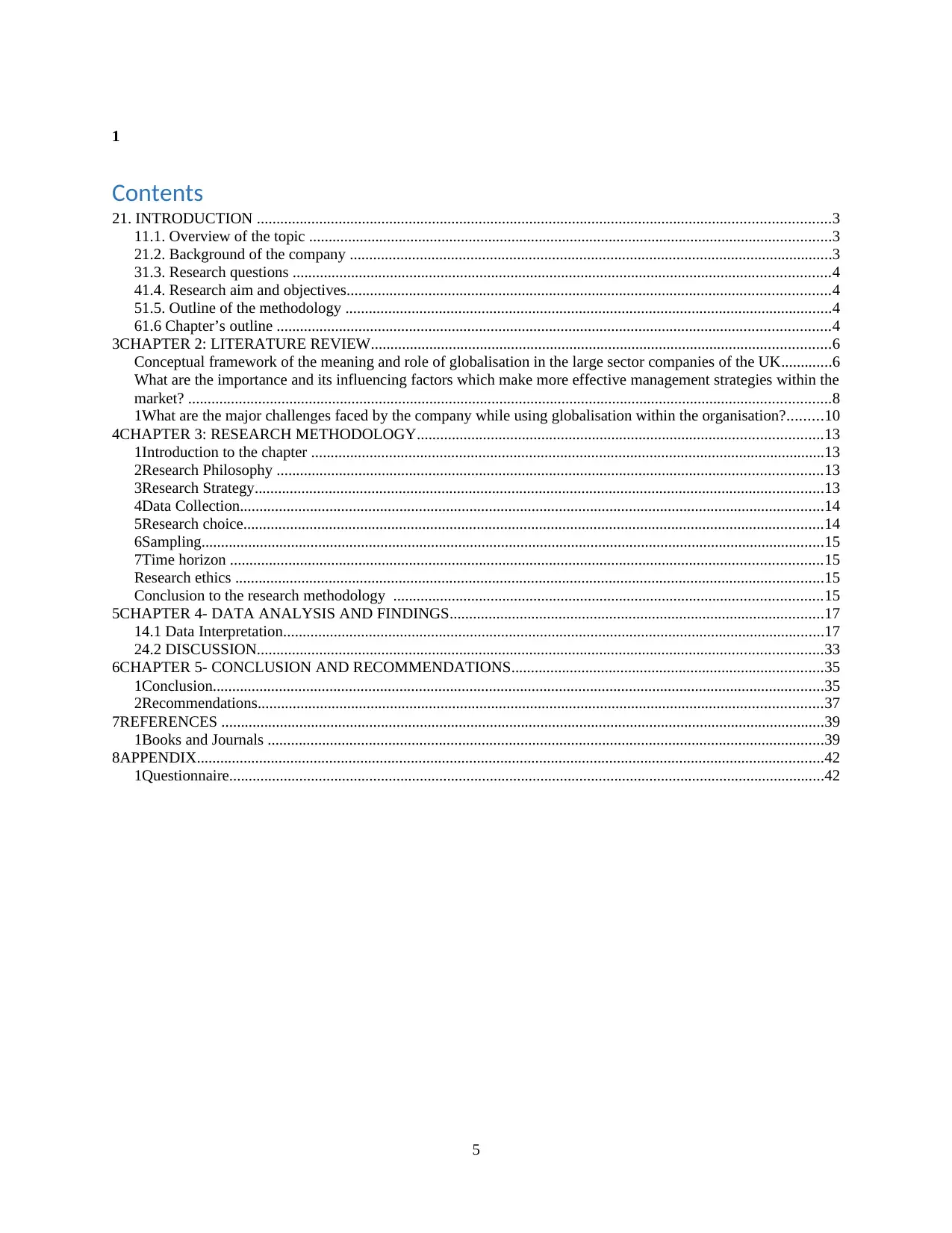
1
Contents
21. INTRODUCTION ...................................................................................................................................................3
11.1. Overview of the topic ......................................................................................................................................3
21.2. Background of the company ............................................................................................................................3
31.3. Research questions ..........................................................................................................................................4
41.4. Research aim and objectives............................................................................................................................4
51.5. Outline of the methodology .............................................................................................................................4
61.6 Chapter’s outline ..............................................................................................................................................4
3CHAPTER 2: LITERATURE REVIEW......................................................................................................................6
Conceptual framework of the meaning and role of globalisation in the large sector companies of the UK.............6
What are the importance and its influencing factors which make more effective management strategies within the
market? .....................................................................................................................................................................8
1What are the major challenges faced by the company while using globalisation within the organisation?.........10
4CHAPTER 3: RESEARCH METHODOLOGY........................................................................................................13
1Introduction to the chapter ....................................................................................................................................13
2Research Philosophy ............................................................................................................................................13
3Research Strategy..................................................................................................................................................13
4Data Collection......................................................................................................................................................14
5Research choice.....................................................................................................................................................14
6Sampling................................................................................................................................................................15
7Time horizon ........................................................................................................................................................15
Research ethics .......................................................................................................................................................15
Conclusion to the research methodology ..............................................................................................................15
5CHAPTER 4- DATA ANALYSIS AND FINDINGS................................................................................................17
14.1 Data Interpretation...........................................................................................................................................17
24.2 DISCUSSION.................................................................................................................................................33
6CHAPTER 5- CONCLUSION AND RECOMMENDATIONS................................................................................35
1Conclusion.............................................................................................................................................................35
2Recommendations.................................................................................................................................................37
7REFERENCES ...........................................................................................................................................................39
1Books and Journals ...............................................................................................................................................39
8APPENDIX.................................................................................................................................................................42
1Questionnaire.........................................................................................................................................................42
5
Contents
21. INTRODUCTION ...................................................................................................................................................3
11.1. Overview of the topic ......................................................................................................................................3
21.2. Background of the company ............................................................................................................................3
31.3. Research questions ..........................................................................................................................................4
41.4. Research aim and objectives............................................................................................................................4
51.5. Outline of the methodology .............................................................................................................................4
61.6 Chapter’s outline ..............................................................................................................................................4
3CHAPTER 2: LITERATURE REVIEW......................................................................................................................6
Conceptual framework of the meaning and role of globalisation in the large sector companies of the UK.............6
What are the importance and its influencing factors which make more effective management strategies within the
market? .....................................................................................................................................................................8
1What are the major challenges faced by the company while using globalisation within the organisation?.........10
4CHAPTER 3: RESEARCH METHODOLOGY........................................................................................................13
1Introduction to the chapter ....................................................................................................................................13
2Research Philosophy ............................................................................................................................................13
3Research Strategy..................................................................................................................................................13
4Data Collection......................................................................................................................................................14
5Research choice.....................................................................................................................................................14
6Sampling................................................................................................................................................................15
7Time horizon ........................................................................................................................................................15
Research ethics .......................................................................................................................................................15
Conclusion to the research methodology ..............................................................................................................15
5CHAPTER 4- DATA ANALYSIS AND FINDINGS................................................................................................17
14.1 Data Interpretation...........................................................................................................................................17
24.2 DISCUSSION.................................................................................................................................................33
6CHAPTER 5- CONCLUSION AND RECOMMENDATIONS................................................................................35
1Conclusion.............................................................................................................................................................35
2Recommendations.................................................................................................................................................37
7REFERENCES ...........................................................................................................................................................39
1Books and Journals ...............................................................................................................................................39
8APPENDIX.................................................................................................................................................................42
1Questionnaire.........................................................................................................................................................42
5
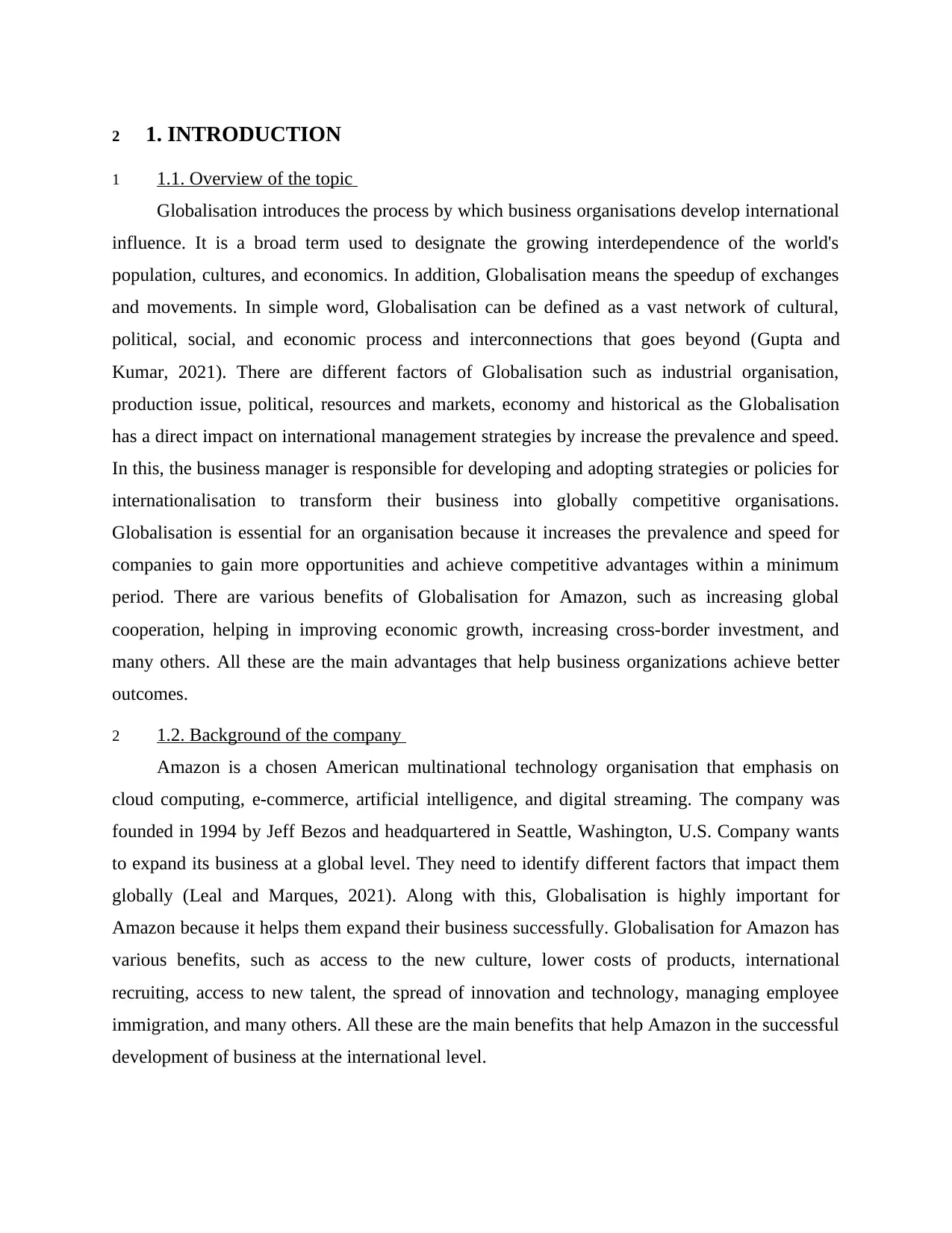
2 1. INTRODUCTION
1 1.1. Overview of the topic
Globalisation introduces the process by which business organisations develop international
influence. It is a broad term used to designate the growing interdependence of the world's
population, cultures, and economics. In addition, Globalisation means the speedup of exchanges
and movements. In simple word, Globalisation can be defined as a vast network of cultural,
political, social, and economic process and interconnections that goes beyond (Gupta and
Kumar, 2021). There are different factors of Globalisation such as industrial organisation,
production issue, political, resources and markets, economy and historical as the Globalisation
has a direct impact on international management strategies by increase the prevalence and speed.
In this, the business manager is responsible for developing and adopting strategies or policies for
internationalisation to transform their business into globally competitive organisations.
Globalisation is essential for an organisation because it increases the prevalence and speed for
companies to gain more opportunities and achieve competitive advantages within a minimum
period. There are various benefits of Globalisation for Amazon, such as increasing global
cooperation, helping in improving economic growth, increasing cross-border investment, and
many others. All these are the main advantages that help business organizations achieve better
outcomes.
2 1.2. Background of the company
Amazon is a chosen American multinational technology organisation that emphasis on
cloud computing, e-commerce, artificial intelligence, and digital streaming. The company was
founded in 1994 by Jeff Bezos and headquartered in Seattle, Washington, U.S. Company wants
to expand its business at a global level. They need to identify different factors that impact them
globally (Leal and Marques, 2021). Along with this, Globalisation is highly important for
Amazon because it helps them expand their business successfully. Globalisation for Amazon has
various benefits, such as access to the new culture, lower costs of products, international
recruiting, access to new talent, the spread of innovation and technology, managing employee
immigration, and many others. All these are the main benefits that help Amazon in the successful
development of business at the international level.
1 1.1. Overview of the topic
Globalisation introduces the process by which business organisations develop international
influence. It is a broad term used to designate the growing interdependence of the world's
population, cultures, and economics. In addition, Globalisation means the speedup of exchanges
and movements. In simple word, Globalisation can be defined as a vast network of cultural,
political, social, and economic process and interconnections that goes beyond (Gupta and
Kumar, 2021). There are different factors of Globalisation such as industrial organisation,
production issue, political, resources and markets, economy and historical as the Globalisation
has a direct impact on international management strategies by increase the prevalence and speed.
In this, the business manager is responsible for developing and adopting strategies or policies for
internationalisation to transform their business into globally competitive organisations.
Globalisation is essential for an organisation because it increases the prevalence and speed for
companies to gain more opportunities and achieve competitive advantages within a minimum
period. There are various benefits of Globalisation for Amazon, such as increasing global
cooperation, helping in improving economic growth, increasing cross-border investment, and
many others. All these are the main advantages that help business organizations achieve better
outcomes.
2 1.2. Background of the company
Amazon is a chosen American multinational technology organisation that emphasis on
cloud computing, e-commerce, artificial intelligence, and digital streaming. The company was
founded in 1994 by Jeff Bezos and headquartered in Seattle, Washington, U.S. Company wants
to expand its business at a global level. They need to identify different factors that impact them
globally (Leal and Marques, 2021). Along with this, Globalisation is highly important for
Amazon because it helps them expand their business successfully. Globalisation for Amazon has
various benefits, such as access to the new culture, lower costs of products, international
recruiting, access to new talent, the spread of innovation and technology, managing employee
immigration, and many others. All these are the main benefits that help Amazon in the successful
development of business at the international level.
⊘ This is a preview!⊘
Do you want full access?
Subscribe today to unlock all pages.

Trusted by 1+ million students worldwide
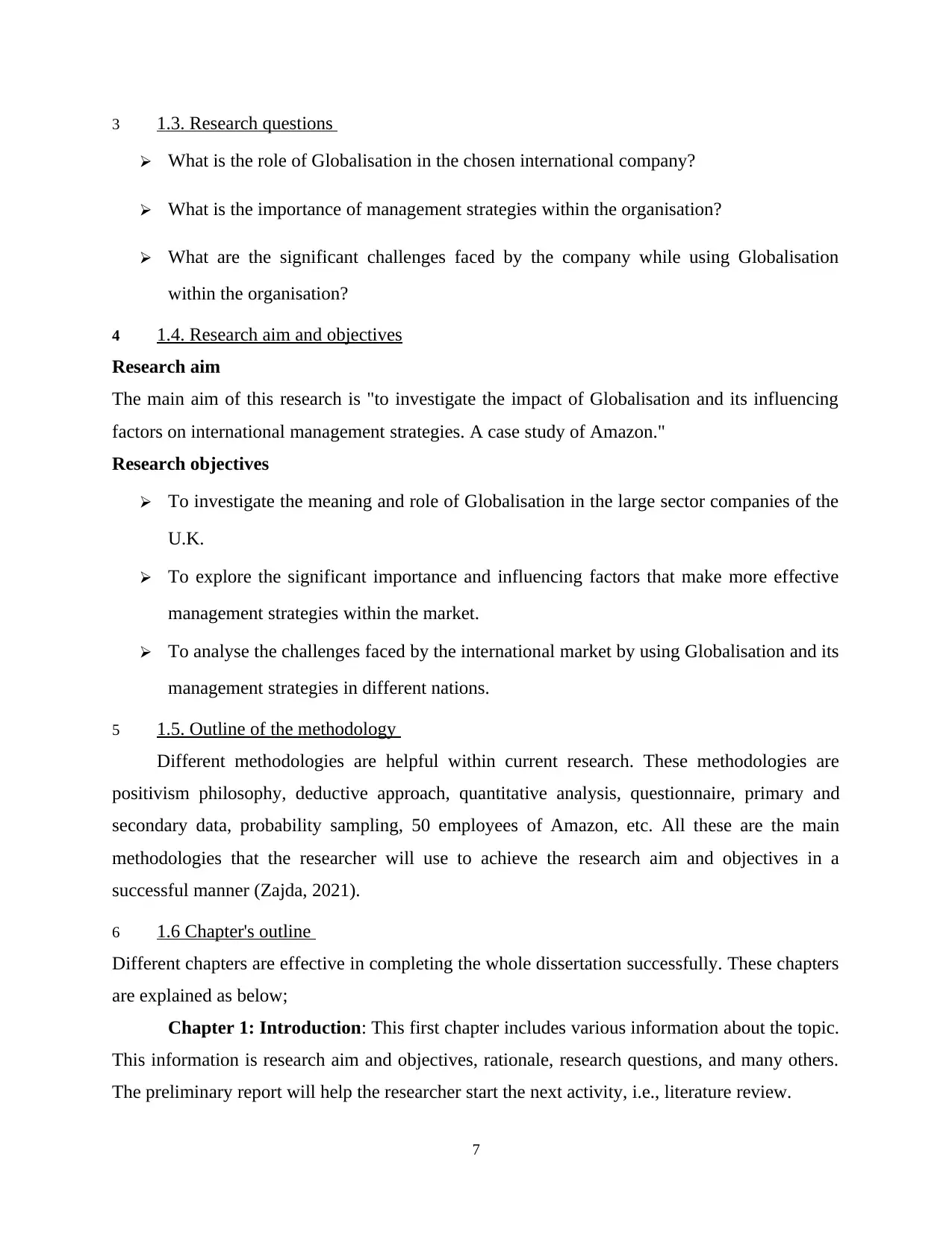
3 1.3. Research questions
⮚ What is the role of Globalisation in the chosen international company?
⮚ What is the importance of management strategies within the organisation?
⮚ What are the significant challenges faced by the company while using Globalisation
within the organisation?
4 1.4. Research aim and objectives
Research aim
The main aim of this research is "to investigate the impact of Globalisation and its influencing
factors on international management strategies. A case study of Amazon."
Research objectives
⮚ To investigate the meaning and role of Globalisation in the large sector companies of the
U.K.
⮚ To explore the significant importance and influencing factors that make more effective
management strategies within the market.
⮚ To analyse the challenges faced by the international market by using Globalisation and its
management strategies in different nations.
5 1.5. Outline of the methodology
Different methodologies are helpful within current research. These methodologies are
positivism philosophy, deductive approach, quantitative analysis, questionnaire, primary and
secondary data, probability sampling, 50 employees of Amazon, etc. All these are the main
methodologies that the researcher will use to achieve the research aim and objectives in a
successful manner (Zajda, 2021).
6 1.6 Chapter's outline
Different chapters are effective in completing the whole dissertation successfully. These chapters
are explained as below;
Chapter 1: Introduction: This first chapter includes various information about the topic.
This information is research aim and objectives, rationale, research questions, and many others.
The preliminary report will help the researcher start the next activity, i.e., literature review.
7
⮚ What is the role of Globalisation in the chosen international company?
⮚ What is the importance of management strategies within the organisation?
⮚ What are the significant challenges faced by the company while using Globalisation
within the organisation?
4 1.4. Research aim and objectives
Research aim
The main aim of this research is "to investigate the impact of Globalisation and its influencing
factors on international management strategies. A case study of Amazon."
Research objectives
⮚ To investigate the meaning and role of Globalisation in the large sector companies of the
U.K.
⮚ To explore the significant importance and influencing factors that make more effective
management strategies within the market.
⮚ To analyse the challenges faced by the international market by using Globalisation and its
management strategies in different nations.
5 1.5. Outline of the methodology
Different methodologies are helpful within current research. These methodologies are
positivism philosophy, deductive approach, quantitative analysis, questionnaire, primary and
secondary data, probability sampling, 50 employees of Amazon, etc. All these are the main
methodologies that the researcher will use to achieve the research aim and objectives in a
successful manner (Zajda, 2021).
6 1.6 Chapter's outline
Different chapters are effective in completing the whole dissertation successfully. These chapters
are explained as below;
Chapter 1: Introduction: This first chapter includes various information about the topic.
This information is research aim and objectives, rationale, research questions, and many others.
The preliminary report will help the researcher start the next activity, i.e., literature review.
7
Paraphrase This Document
Need a fresh take? Get an instant paraphrase of this document with our AI Paraphraser
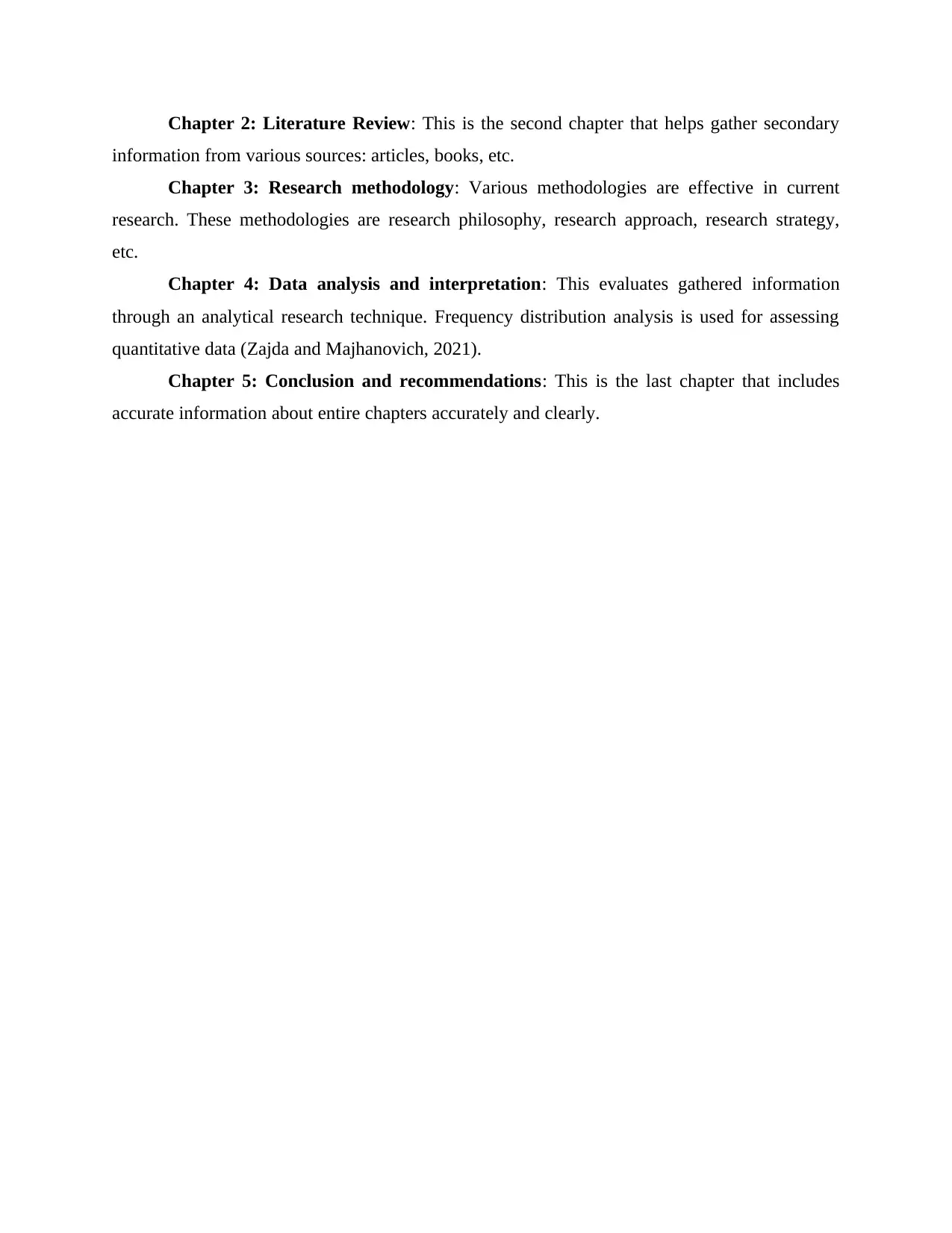
Chapter 2: Literature Review: This is the second chapter that helps gather secondary
information from various sources: articles, books, etc.
Chapter 3: Research methodology: Various methodologies are effective in current
research. These methodologies are research philosophy, research approach, research strategy,
etc.
Chapter 4: Data analysis and interpretation: This evaluates gathered information
through an analytical research technique. Frequency distribution analysis is used for assessing
quantitative data (Zajda and Majhanovich, 2021).
Chapter 5: Conclusion and recommendations: This is the last chapter that includes
accurate information about entire chapters accurately and clearly.
information from various sources: articles, books, etc.
Chapter 3: Research methodology: Various methodologies are effective in current
research. These methodologies are research philosophy, research approach, research strategy,
etc.
Chapter 4: Data analysis and interpretation: This evaluates gathered information
through an analytical research technique. Frequency distribution analysis is used for assessing
quantitative data (Zajda and Majhanovich, 2021).
Chapter 5: Conclusion and recommendations: This is the last chapter that includes
accurate information about entire chapters accurately and clearly.
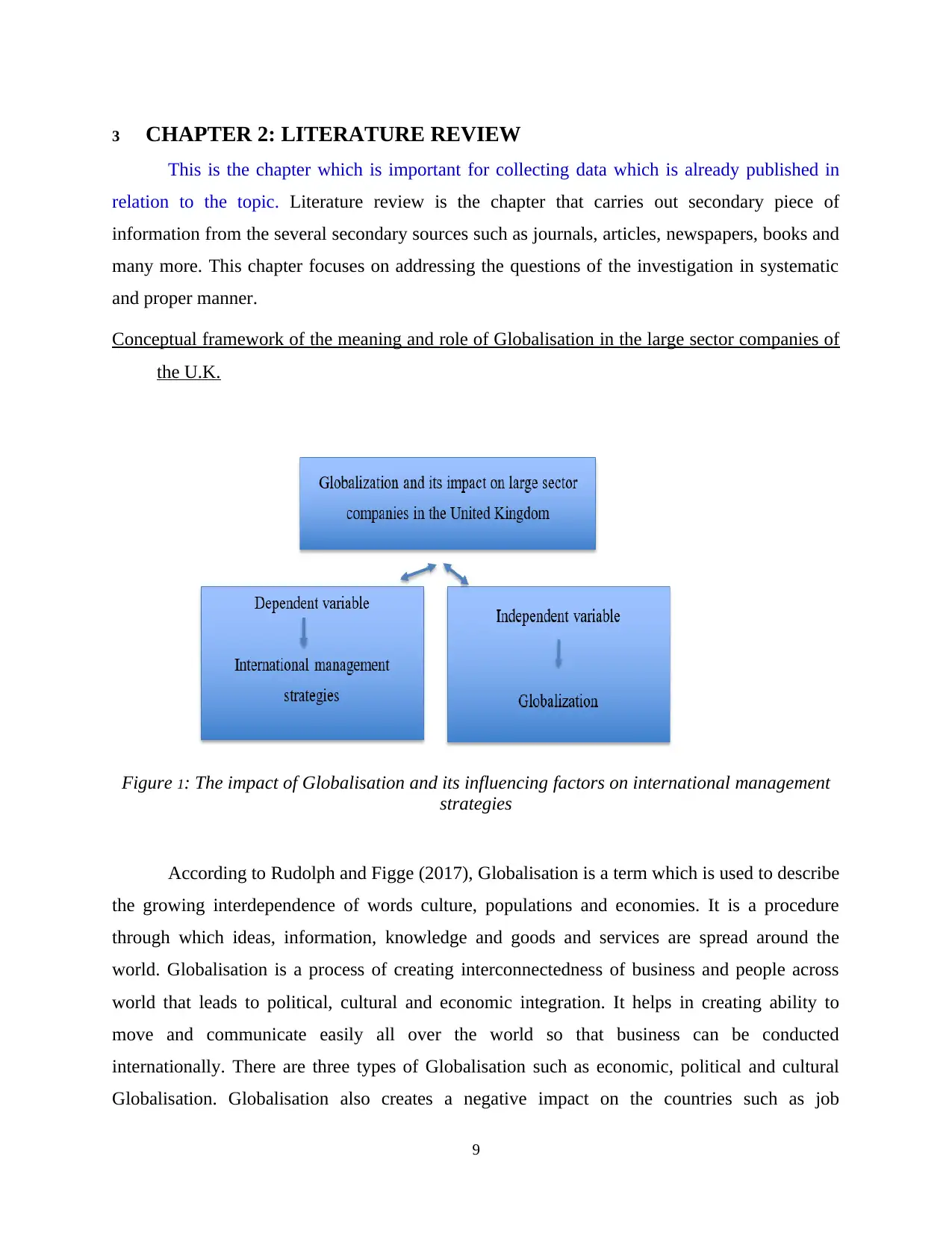
3 CHAPTER 2: LITERATURE REVIEW
This is the chapter which is important for collecting data which is already published in
relation to the topic. Literature review is the chapter that carries out secondary piece of
information from the several secondary sources such as journals, articles, newspapers, books and
many more. This chapter focuses on addressing the questions of the investigation in systematic
and proper manner.
Conceptual framework of the meaning and role of Globalisation in the large sector companies of
the U.K.
Figure 1: The impact of Globalisation and its influencing factors on international management
strategies
According to Rudolph and Figge (2017), Globalisation is a term which is used to describe
the growing interdependence of words culture, populations and economies. It is a procedure
through which ideas, information, knowledge and goods and services are spread around the
world. Globalisation is a process of creating interconnectedness of business and people across
world that leads to political, cultural and economic integration. It helps in creating ability to
move and communicate easily all over the world so that business can be conducted
internationally. There are three types of Globalisation such as economic, political and cultural
Globalisation. Globalisation also creates a negative impact on the countries such as job
9
This is the chapter which is important for collecting data which is already published in
relation to the topic. Literature review is the chapter that carries out secondary piece of
information from the several secondary sources such as journals, articles, newspapers, books and
many more. This chapter focuses on addressing the questions of the investigation in systematic
and proper manner.
Conceptual framework of the meaning and role of Globalisation in the large sector companies of
the U.K.
Figure 1: The impact of Globalisation and its influencing factors on international management
strategies
According to Rudolph and Figge (2017), Globalisation is a term which is used to describe
the growing interdependence of words culture, populations and economies. It is a procedure
through which ideas, information, knowledge and goods and services are spread around the
world. Globalisation is a process of creating interconnectedness of business and people across
world that leads to political, cultural and economic integration. It helps in creating ability to
move and communicate easily all over the world so that business can be conducted
internationally. There are three types of Globalisation such as economic, political and cultural
Globalisation. Globalisation also creates a negative impact on the countries such as job
9
⊘ This is a preview!⊘
Do you want full access?
Subscribe today to unlock all pages.

Trusted by 1+ million students worldwide
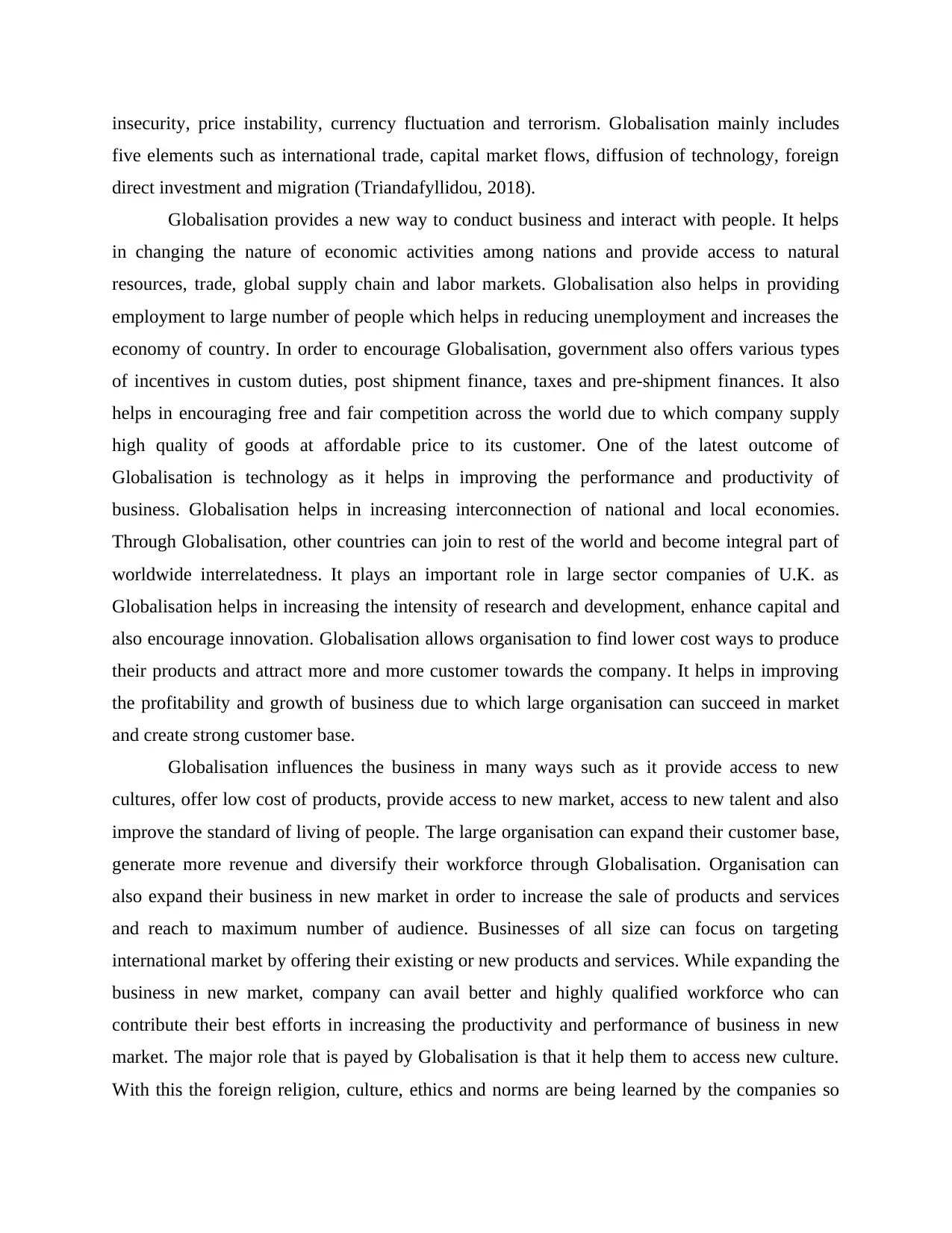
insecurity, price instability, currency fluctuation and terrorism. Globalisation mainly includes
five elements such as international trade, capital market flows, diffusion of technology, foreign
direct investment and migration (Triandafyllidou, 2018).
Globalisation provides a new way to conduct business and interact with people. It helps
in changing the nature of economic activities among nations and provide access to natural
resources, trade, global supply chain and labor markets. Globalisation also helps in providing
employment to large number of people which helps in reducing unemployment and increases the
economy of country. In order to encourage Globalisation, government also offers various types
of incentives in custom duties, post shipment finance, taxes and pre-shipment finances. It also
helps in encouraging free and fair competition across the world due to which company supply
high quality of goods at affordable price to its customer. One of the latest outcome of
Globalisation is technology as it helps in improving the performance and productivity of
business. Globalisation helps in increasing interconnection of national and local economies.
Through Globalisation, other countries can join to rest of the world and become integral part of
worldwide interrelatedness. It plays an important role in large sector companies of U.K. as
Globalisation helps in increasing the intensity of research and development, enhance capital and
also encourage innovation. Globalisation allows organisation to find lower cost ways to produce
their products and attract more and more customer towards the company. It helps in improving
the profitability and growth of business due to which large organisation can succeed in market
and create strong customer base.
Globalisation influences the business in many ways such as it provide access to new
cultures, offer low cost of products, provide access to new market, access to new talent and also
improve the standard of living of people. The large organisation can expand their customer base,
generate more revenue and diversify their workforce through Globalisation. Organisation can
also expand their business in new market in order to increase the sale of products and services
and reach to maximum number of audience. Businesses of all size can focus on targeting
international market by offering their existing or new products and services. While expanding the
business in new market, company can avail better and highly qualified workforce who can
contribute their best efforts in increasing the productivity and performance of business in new
market. The major role that is payed by Globalisation is that it help them to access new culture.
With this the foreign religion, culture, ethics and norms are being learned by the companies so
five elements such as international trade, capital market flows, diffusion of technology, foreign
direct investment and migration (Triandafyllidou, 2018).
Globalisation provides a new way to conduct business and interact with people. It helps
in changing the nature of economic activities among nations and provide access to natural
resources, trade, global supply chain and labor markets. Globalisation also helps in providing
employment to large number of people which helps in reducing unemployment and increases the
economy of country. In order to encourage Globalisation, government also offers various types
of incentives in custom duties, post shipment finance, taxes and pre-shipment finances. It also
helps in encouraging free and fair competition across the world due to which company supply
high quality of goods at affordable price to its customer. One of the latest outcome of
Globalisation is technology as it helps in improving the performance and productivity of
business. Globalisation helps in increasing interconnection of national and local economies.
Through Globalisation, other countries can join to rest of the world and become integral part of
worldwide interrelatedness. It plays an important role in large sector companies of U.K. as
Globalisation helps in increasing the intensity of research and development, enhance capital and
also encourage innovation. Globalisation allows organisation to find lower cost ways to produce
their products and attract more and more customer towards the company. It helps in improving
the profitability and growth of business due to which large organisation can succeed in market
and create strong customer base.
Globalisation influences the business in many ways such as it provide access to new
cultures, offer low cost of products, provide access to new market, access to new talent and also
improve the standard of living of people. The large organisation can expand their customer base,
generate more revenue and diversify their workforce through Globalisation. Organisation can
also expand their business in new market in order to increase the sale of products and services
and reach to maximum number of audience. Businesses of all size can focus on targeting
international market by offering their existing or new products and services. While expanding the
business in new market, company can avail better and highly qualified workforce who can
contribute their best efforts in increasing the productivity and performance of business in new
market. The major role that is payed by Globalisation is that it help them to access new culture.
With this the foreign religion, culture, ethics and norms are being learned by the companies so
Paraphrase This Document
Need a fresh take? Get an instant paraphrase of this document with our AI Paraphraser
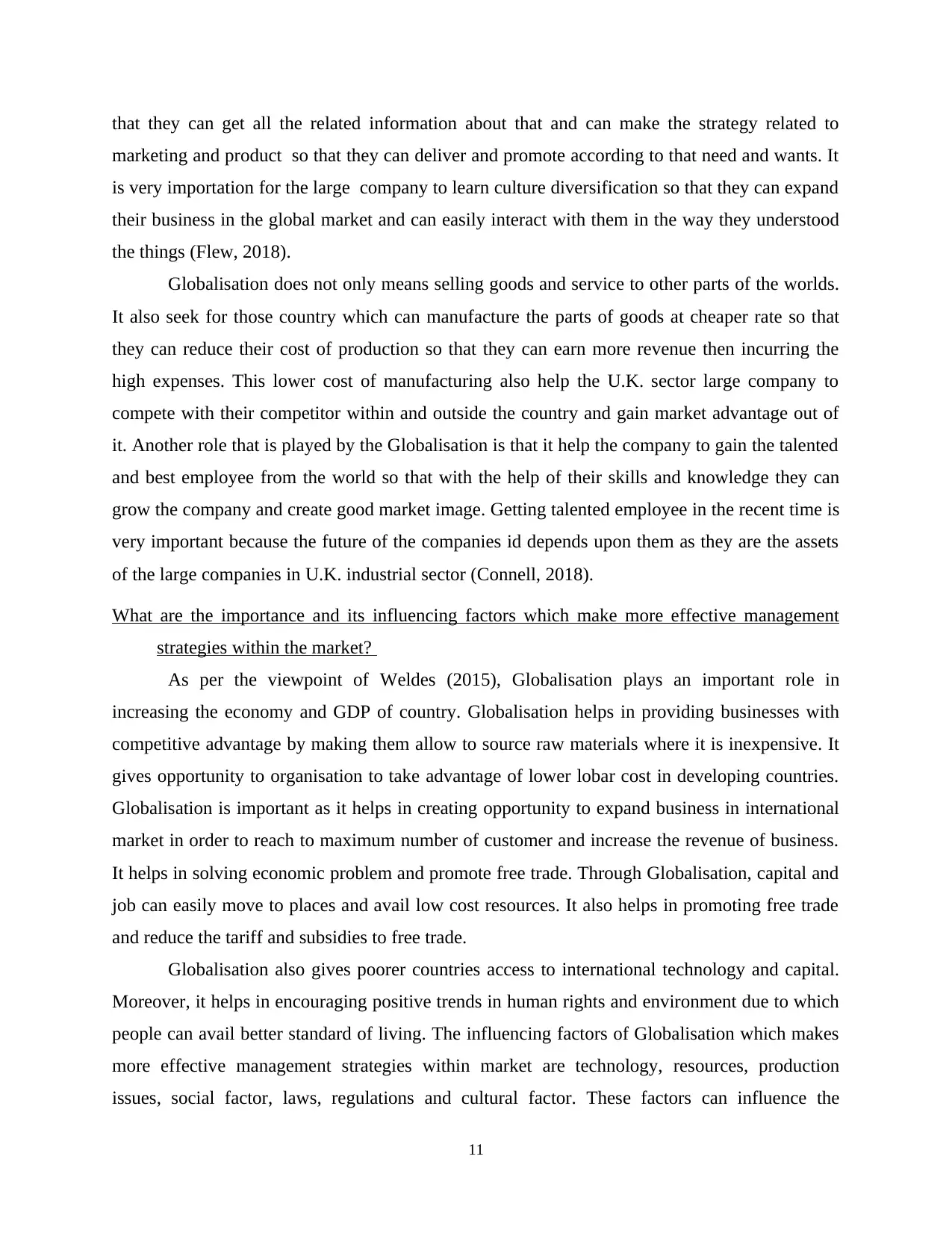
that they can get all the related information about that and can make the strategy related to
marketing and product so that they can deliver and promote according to that need and wants. It
is very importation for the large company to learn culture diversification so that they can expand
their business in the global market and can easily interact with them in the way they understood
the things (Flew, 2018).
Globalisation does not only means selling goods and service to other parts of the worlds.
It also seek for those country which can manufacture the parts of goods at cheaper rate so that
they can reduce their cost of production so that they can earn more revenue then incurring the
high expenses. This lower cost of manufacturing also help the U.K. sector large company to
compete with their competitor within and outside the country and gain market advantage out of
it. Another role that is played by the Globalisation is that it help the company to gain the talented
and best employee from the world so that with the help of their skills and knowledge they can
grow the company and create good market image. Getting talented employee in the recent time is
very important because the future of the companies id depends upon them as they are the assets
of the large companies in U.K. industrial sector (Connell, 2018).
What are the importance and its influencing factors which make more effective management
strategies within the market?
As per the viewpoint of Weldes (2015), Globalisation plays an important role in
increasing the economy and GDP of country. Globalisation helps in providing businesses with
competitive advantage by making them allow to source raw materials where it is inexpensive. It
gives opportunity to organisation to take advantage of lower lobar cost in developing countries.
Globalisation is important as it helps in creating opportunity to expand business in international
market in order to reach to maximum number of customer and increase the revenue of business.
It helps in solving economic problem and promote free trade. Through Globalisation, capital and
job can easily move to places and avail low cost resources. It also helps in promoting free trade
and reduce the tariff and subsidies to free trade.
Globalisation also gives poorer countries access to international technology and capital.
Moreover, it helps in encouraging positive trends in human rights and environment due to which
people can avail better standard of living. The influencing factors of Globalisation which makes
more effective management strategies within market are technology, resources, production
issues, social factor, laws, regulations and cultural factor. These factors can influence the
11
marketing and product so that they can deliver and promote according to that need and wants. It
is very importation for the large company to learn culture diversification so that they can expand
their business in the global market and can easily interact with them in the way they understood
the things (Flew, 2018).
Globalisation does not only means selling goods and service to other parts of the worlds.
It also seek for those country which can manufacture the parts of goods at cheaper rate so that
they can reduce their cost of production so that they can earn more revenue then incurring the
high expenses. This lower cost of manufacturing also help the U.K. sector large company to
compete with their competitor within and outside the country and gain market advantage out of
it. Another role that is played by the Globalisation is that it help the company to gain the talented
and best employee from the world so that with the help of their skills and knowledge they can
grow the company and create good market image. Getting talented employee in the recent time is
very important because the future of the companies id depends upon them as they are the assets
of the large companies in U.K. industrial sector (Connell, 2018).
What are the importance and its influencing factors which make more effective management
strategies within the market?
As per the viewpoint of Weldes (2015), Globalisation plays an important role in
increasing the economy and GDP of country. Globalisation helps in providing businesses with
competitive advantage by making them allow to source raw materials where it is inexpensive. It
gives opportunity to organisation to take advantage of lower lobar cost in developing countries.
Globalisation is important as it helps in creating opportunity to expand business in international
market in order to reach to maximum number of customer and increase the revenue of business.
It helps in solving economic problem and promote free trade. Through Globalisation, capital and
job can easily move to places and avail low cost resources. It also helps in promoting free trade
and reduce the tariff and subsidies to free trade.
Globalisation also gives poorer countries access to international technology and capital.
Moreover, it helps in encouraging positive trends in human rights and environment due to which
people can avail better standard of living. The influencing factors of Globalisation which makes
more effective management strategies within market are technology, resources, production
issues, social factor, laws, regulations and cultural factor. These factors can influence the
11
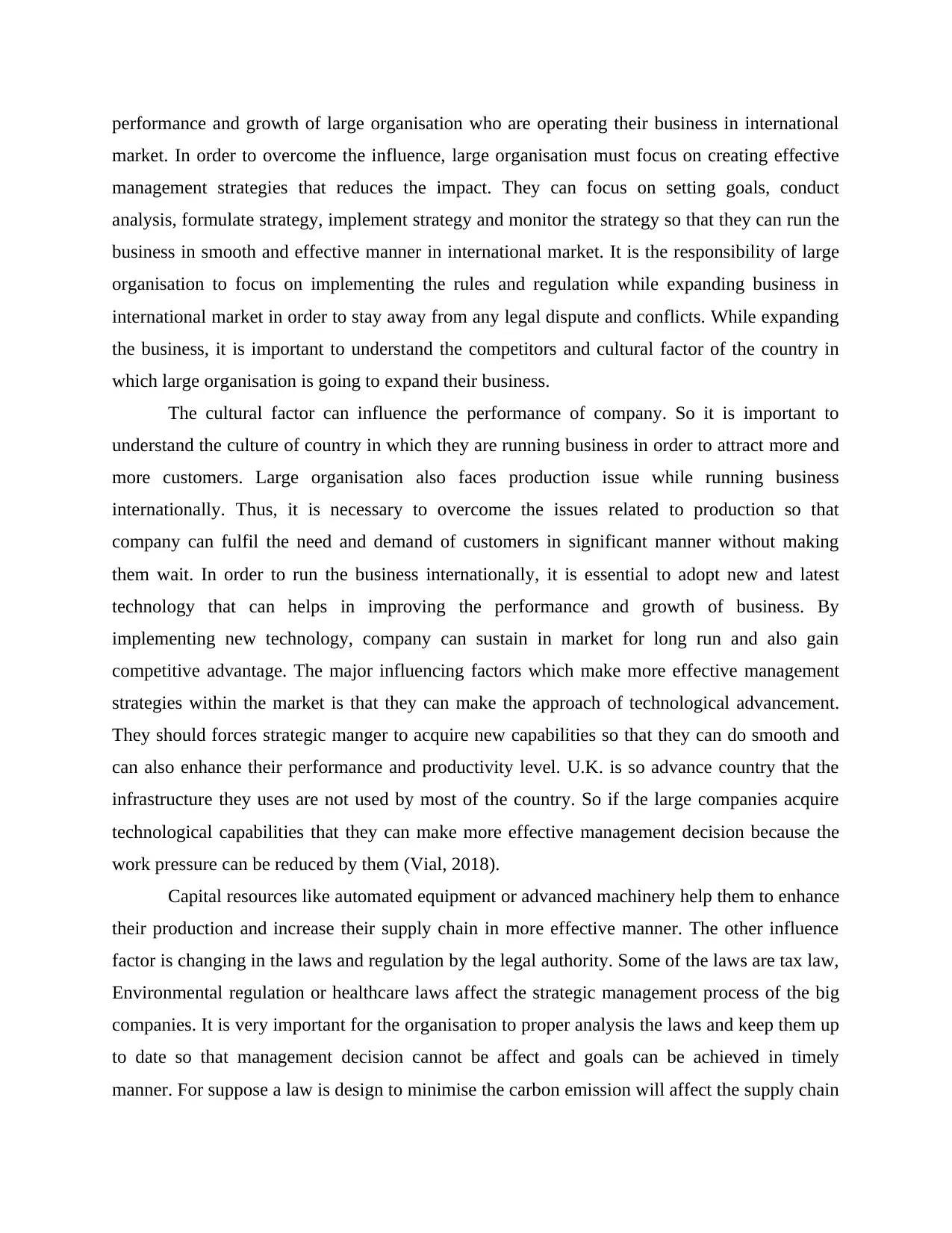
performance and growth of large organisation who are operating their business in international
market. In order to overcome the influence, large organisation must focus on creating effective
management strategies that reduces the impact. They can focus on setting goals, conduct
analysis, formulate strategy, implement strategy and monitor the strategy so that they can run the
business in smooth and effective manner in international market. It is the responsibility of large
organisation to focus on implementing the rules and regulation while expanding business in
international market in order to stay away from any legal dispute and conflicts. While expanding
the business, it is important to understand the competitors and cultural factor of the country in
which large organisation is going to expand their business.
The cultural factor can influence the performance of company. So it is important to
understand the culture of country in which they are running business in order to attract more and
more customers. Large organisation also faces production issue while running business
internationally. Thus, it is necessary to overcome the issues related to production so that
company can fulfil the need and demand of customers in significant manner without making
them wait. In order to run the business internationally, it is essential to adopt new and latest
technology that can helps in improving the performance and growth of business. By
implementing new technology, company can sustain in market for long run and also gain
competitive advantage. The major influencing factors which make more effective management
strategies within the market is that they can make the approach of technological advancement.
They should forces strategic manger to acquire new capabilities so that they can do smooth and
can also enhance their performance and productivity level. U.K. is so advance country that the
infrastructure they uses are not used by most of the country. So if the large companies acquire
technological capabilities that they can make more effective management decision because the
work pressure can be reduced by them (Vial, 2018).
Capital resources like automated equipment or advanced machinery help them to enhance
their production and increase their supply chain in more effective manner. The other influence
factor is changing in the laws and regulation by the legal authority. Some of the laws are tax law,
Environmental regulation or healthcare laws affect the strategic management process of the big
companies. It is very important for the organisation to proper analysis the laws and keep them up
to date so that management decision cannot be affect and goals can be achieved in timely
manner. For suppose a law is design to minimise the carbon emission will affect the supply chain
market. In order to overcome the influence, large organisation must focus on creating effective
management strategies that reduces the impact. They can focus on setting goals, conduct
analysis, formulate strategy, implement strategy and monitor the strategy so that they can run the
business in smooth and effective manner in international market. It is the responsibility of large
organisation to focus on implementing the rules and regulation while expanding business in
international market in order to stay away from any legal dispute and conflicts. While expanding
the business, it is important to understand the competitors and cultural factor of the country in
which large organisation is going to expand their business.
The cultural factor can influence the performance of company. So it is important to
understand the culture of country in which they are running business in order to attract more and
more customers. Large organisation also faces production issue while running business
internationally. Thus, it is necessary to overcome the issues related to production so that
company can fulfil the need and demand of customers in significant manner without making
them wait. In order to run the business internationally, it is essential to adopt new and latest
technology that can helps in improving the performance and growth of business. By
implementing new technology, company can sustain in market for long run and also gain
competitive advantage. The major influencing factors which make more effective management
strategies within the market is that they can make the approach of technological advancement.
They should forces strategic manger to acquire new capabilities so that they can do smooth and
can also enhance their performance and productivity level. U.K. is so advance country that the
infrastructure they uses are not used by most of the country. So if the large companies acquire
technological capabilities that they can make more effective management decision because the
work pressure can be reduced by them (Vial, 2018).
Capital resources like automated equipment or advanced machinery help them to enhance
their production and increase their supply chain in more effective manner. The other influence
factor is changing in the laws and regulation by the legal authority. Some of the laws are tax law,
Environmental regulation or healthcare laws affect the strategic management process of the big
companies. It is very important for the organisation to proper analysis the laws and keep them up
to date so that management decision cannot be affect and goals can be achieved in timely
manner. For suppose a law is design to minimise the carbon emission will affect the supply chain
⊘ This is a preview!⊘
Do you want full access?
Subscribe today to unlock all pages.

Trusted by 1+ million students worldwide
1 out of 49
Related Documents
Your All-in-One AI-Powered Toolkit for Academic Success.
+13062052269
info@desklib.com
Available 24*7 on WhatsApp / Email
![[object Object]](/_next/static/media/star-bottom.7253800d.svg)
Unlock your academic potential
Copyright © 2020–2026 A2Z Services. All Rights Reserved. Developed and managed by ZUCOL.





